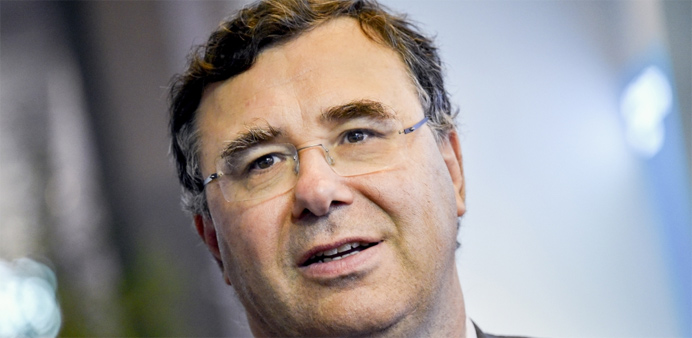By Pratap John/Chief Business Reporter
Total is keen to develop its solar business in Qatar, said Chief Executive officer Patrick Pouyanné.
“Globally, we are number two in solar business. We have acquired SunPower, the world’s second-largest solar energy company based in the US,” Pouyanné told Gulf Times here yesterday.
SunPower designs and manufactures high-efficiency crystalline silicon photovoltaic cells, roof tiles and solar panels in the US.
“We are interested to develop our solar business including in Qatar, for which discussions are going on with Qatar Petroleum. I hope we will be able to make some solar projects in Qatar…it is a key element of our strategy,” Pouyanné said.
Already, Total is engaged in the solar business in the UAE, where it has built a plant in partnership with Masdar and Abengoa Solar.
Inaugurated in the Abu Dhabi desert in 2013, Shams is the largest concentrated solar thermal power plant in the Middle East.
Speaking to reporters at Total’s stall at the International Petroleum technology Conference (IPTC 2015) at the Qatar National Convention Centre (QNCC) he said oil prices are not expected to rise next year.
"We don't anticipate a recovery in 2016," Pouyanné said.
"Having said that I don't know if the price will be at 40, 45, 50, 60 dollars per barrel, he added.
"In 2016 the growth of capacity will still be larger than the growth of demand.
"I am not very optimistic for 2016, beyond that it is difficult to know."
Oil prices have nosedived by more than 60% in the last 18 months, with the world's largest oil producing nations defying calls to reduce output.
Crude prices fell heavily on Friday as West Texas Intermediate sank 1% percent and Brent lost 1.9%, AFP said in a dispatch.
However, Pouyanne added that Total had budgeted to meet the continued lower oil prices and ruled out any job losses in the near future.
"My job is to be sure that we can make profits whatever the price is," he told AFP.
"The good answer which we are working on in Total is to lower the break-even," he said, adding that the objective is to break even at $60 a barrel in 2017.
Pouyanne added that he was not surprised by OPEC's decision last week against slashing high output levels.
He added that he expected "non-OPEC supply" to contract next year.
"Non-OPEC supply will contract because US supply will contract from the middle of next year. From mid-2016 we should begin to see a contraction of US production," he said.

